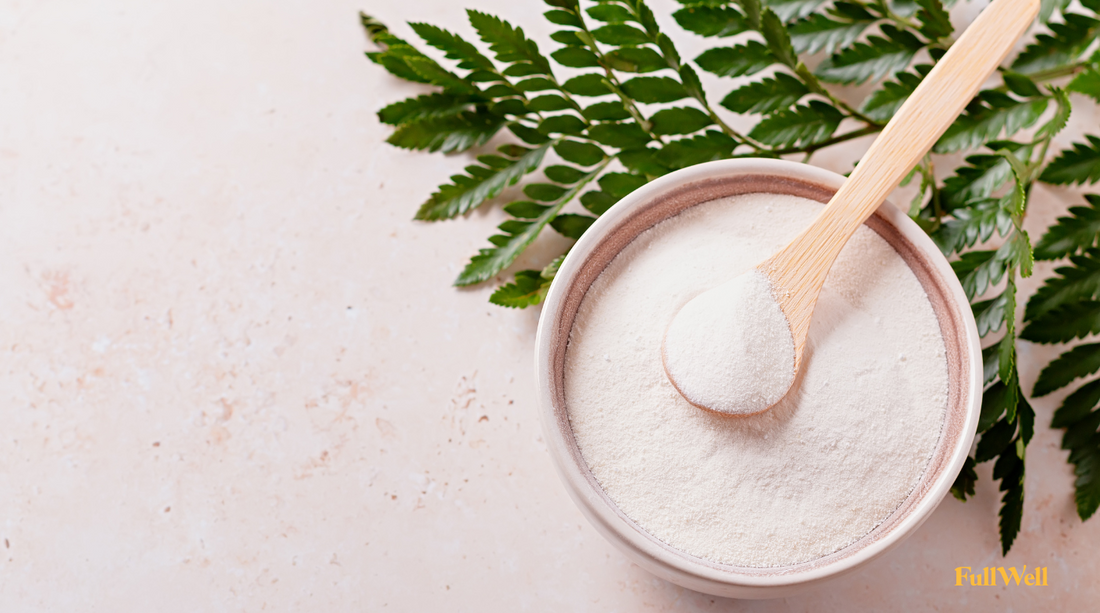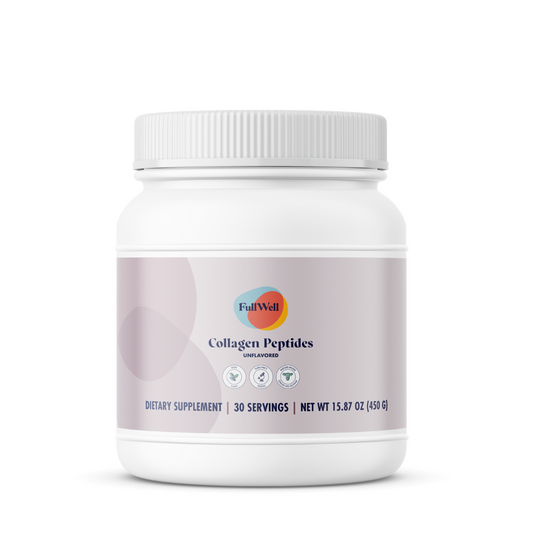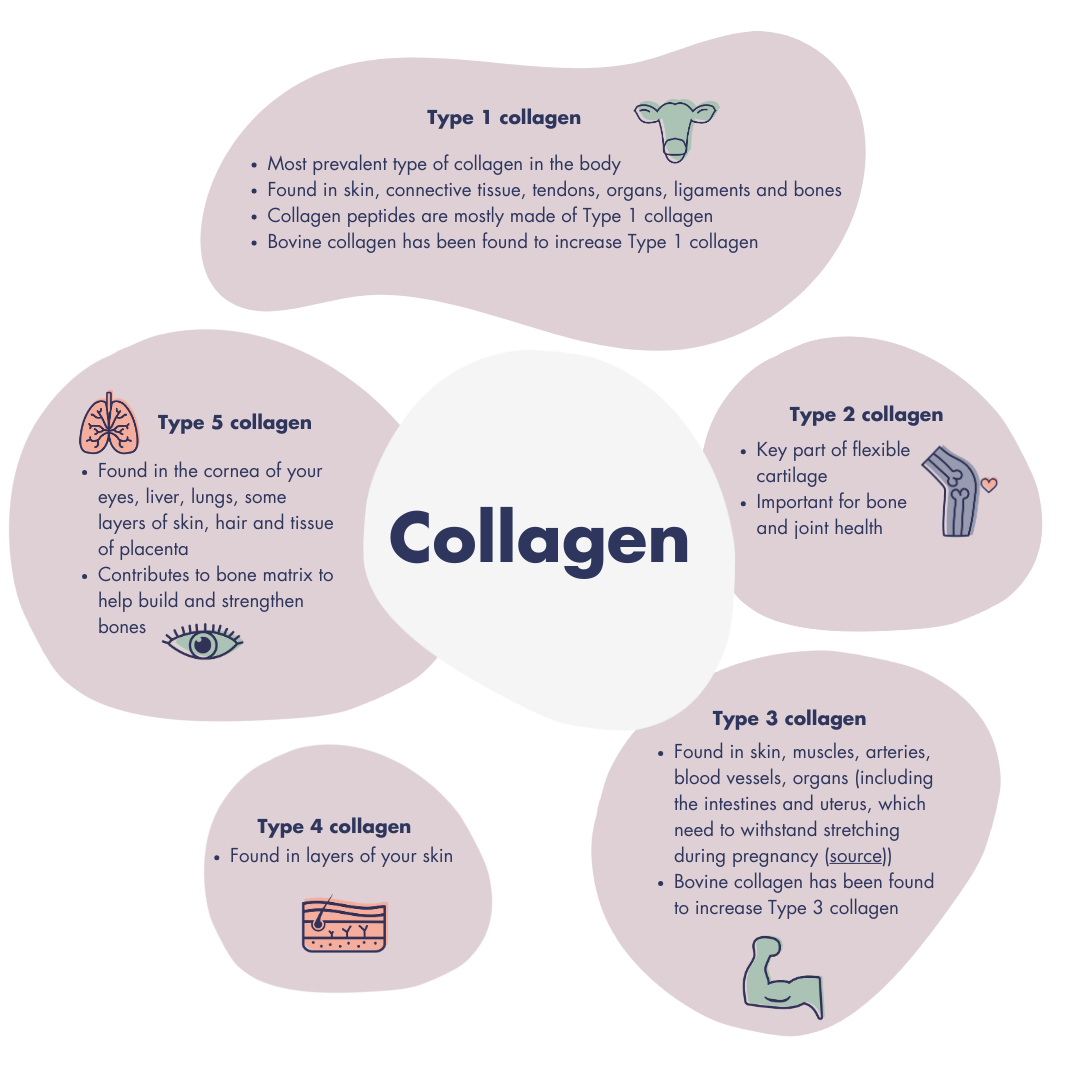Best Collagen for Women
TL;DR
- As the most abundant protein in the human body, collagen is essential for maintaining the strength and elasticity of our skin, bones, joints, and overall health.
- As we age, collagen production naturally declines, meaning that many people can benefit from collagen supplementation.
- For overall health, including during and after pregnancy, type 1 and type 3 collagen are especially effective in addressing both general wellness and specific needs related to pregnancy and recovery.*
- When selecting a high-quality collagen supplement, choose one with hydrolyzed collagen peptides from 100% pasture-raised, grass-fed, and finished cattle. Ensure it is independently tested for accuracy, heavy metals, and allergens, complies with Prop 65, and contains no unnecessary additives or preservatives.
- Protein plays a crucial role in fertility, pregnancy, and postpartum recovery and collagen supplements can be a great way to ensure you meet your needs.*

What is collagen?
As the most abundant protein in the human body, collagen is essential for maintaining the strength and elasticity of our skin, bones, joints, and overall health. As we age, collagen production naturally declines (1), meaning that many people can benefit from collagen supplementation.
This powerhouse protein, with its unique triple-helix structure, made up of amino acids like glycine, proline, and hydroxyproline (2), provides the foundational support our bodies need.
But collagen isn’t just about looking good and moving well - it’s also a key player in supporting your health during pregnancy and beyond.* Collagen peptides offer a convenient way to supplement increased protein needs and unlock a wide range of health benefits.*
Types of collagen
Collagen comes in different forms, each designed to do specific jobs in the body. Scientists have discovered 28 types of collagen, but the most common ones are types 1 through 4. Among these, type 1 is the most abundant, making up over 90% of the collagen in our bodies (2).
Type 1 collagen:
- Most prevalent type of collagen in the body
- Found in skin, connective tissue, tendons, organs, ligaments and bones
- Collagen peptides are mostly made of Type 1 collagen
- Bovine collagen has been found to increase Type 1 collagen
Type 2 collagen:
- Key part of flexible cartilage
- Important for bone and joint health
Type 3 collagen:
- Found in skin, muscles, arteries, blood vessels, organs (including the intestines and uterus, which need to withstand stretching during pregnancy (4))
- Bovine collagen has been found to increase Type 3 collagen
Type 4 collagen:
- Found in layers of your skin
Type 5 collagen:
- Found in the cornea of your eyes, liver, lungs, some layers of skin, hair and tissue of placenta
- Contributes to bone matrix to help build and strengthen bones
Collagen Type 1 and 3
For overall health, including during and after pregnancy, type 1 and type 3 collagen are especially effective in addressing both general wellness and specific needs related to pregnancy and recovery.* Check out our blog on the benefits of collagen for women here.
Sources of collagen
Your body naturally produces collagen, but you can also boost your intake by consuming animal-based foods like bone broth, organ meats, and connective tissues, or through supplements.
Many people have moved away from the traditional "nose to tail" eating approach, which involved using every part of the animal. This shift is due to changes in food production, personal preferences, plant-based diets, and a focus on leaner meats and convenience foods (collagen needs to be slow cooked over a very long period of time to be broken down and absorbed well by the body). As a result, collagen-rich foods, which are excellent sources of glycine—a key amino acid—are consumed less often.
Collagen supplements, typically sourced from beef (bovine) or fish (marine), offer a convenient way to reap these benefits even if your diet lacks collagen-rich foods.
Keep in mind, there’s no vegan collagen that offers the same benefits as beef or marine sources. Vegan collagen supplements simply provide some of the key building blocks, like vitamin C, to help your body produce its own collagen.
Bovine collagen versus marine collagen
Bovine collagen, sourced from beef, and marine collagen, sourced from fish, each offer unique benefits. Bovine collagen is highly bioavailable, meaning it’s easily absorbed by the body (5, 6), and contains both type 1 and 3 collagen, making it excellent for supporting overall health, including during pregnancy, postpartum, and beyond.*
Marine collagen on the other hand, primarily consists of type 1 collagen. Choosing between them depends on your specific needs: if you want a supplement that’s easily absorbed and supports a range of benefits, bovine collagen might be the better choice.
What is the difference between collagen and hydrolyzed collagen peptides?
What are hydrolyzed collagen peptides?
Hydrolyzed collagen peptides are small, easily digestible fragments of collagen created through a process called hydrolysis. During hydrolysis, the large, complex collagen molecules are broken down into shorter chains of amino acids. This process makes the collagen peptides more readily absorbed and utilized by the body compared to unprocessed collagen in its native form from hides or bones. This makes collagen easier to digest, absorb, dissolve, and use in hot or cold liquids.
Collagen peptides are also bioactive, meaning they act as messengers that signal tissues to produce and reorganize collagen. These peptides help stimulate the repair process, promoting the creation of new collagen fibers and supporting the regeneration of targeted tissues.
Partially hydrolyzed collagen, on the other hand, is broken down into smaller peptides but not to the extent of fully hydrolyzed collagen (e.g. gelatin, protein bars, etc). It can only be dissolved in warm/hot liquids, so it’s not as convenient and is slower to digest. Collagen peptides are often used in dietary supplements and are typically available in powders, capsules, or liquids and can be added to foods and beverages for convenience.
When choosing a supplement, look for one that contains hydrolyzed collagen peptides for easier digestion and absorption.
What is the best form of collagen to take?
When choosing the best form of collagen to take, there are a few key considerations. In addition to looking for a highly bioavailable collagen, such as bovine collagen for better absorption, consider factors like sourcing, the quality of the collagen, and whether it has undergone rigorous testing.
Grass-fed collagen
Grass-fed, pasture-raised and grass-finished are terms used to describe how animals are raised and what they eat, which can significantly improve the quality and nutrient density of collagen supplements:
- Grass-fed means the animal’s diet consists primarily of grass and forage instead of grain.
- Pasture-raised means the animals are raised on pasture with access to outdoor spaces, allowing them to graze and roam freely.
- Grass-finished refers to animals that are fed a diet of grass and forage for their entire lives, including during the final stages before processing.
Look for hydrolyzed collagen peptides that are sourced from 100% pasture-raised, grass-fed and grass-finished bovine.
Also, choose companies that partner with suppliers dedicated to protecting rainforests and preventing illegal or unethical deforestation, and ensure that all water used in production is responsibly sourced. This way, you can be confident that your collagen is not only high quality but also sustainably produced.
Third party tested collagen
Choose companies that go above and beyond industry standards to ensure the safety and quality of their collagen supplements. Look for those that conduct third-party testing on every single batch to verify identity and check for contaminants, including heavy metals like lead, and that comply with Prop 65 regulations. This added layer of scrutiny ensures that the collagen you’re taking is both effective and free from harmful substances.
Are collagen supplements safe?
Yes! Our Collagen Peptides are safe to take while trying to conceive, pregnant or breastfeeding.
Collagen peptides are considered safe to use by the FDA and have earned what's called 'GRAS' status, which stands for 'Generally Recognized As Safe.' This means experts agree that they are safe to consume in the amounts typically used in foods or supplements.
Can you take collagen while trying to conceive?
Yes! Protein plays a crucial role in fertility, pregnancy, and postpartum recovery and collagen supplements can be a great way to ensure you meet your needs.* Adequate protein intake supports reproductive health by aiding in the production of essential hormones and enzymes.*
Collagen also contains glycine, one of three key amino acids needed to produce glutathione, a powerful antioxidant that helps protect your cells from damage caused by free radicals. Without enough glycine, your body can’t make as much glutathione, which means it might struggle more with managing oxidative stress over time (7), and protecting those precious eggs and sperm.*
Is collagen safe during pregnancy?
Yes! Not only does collagen support moms to meet elevated protein requirements during pregnancy and postpartum, but it is crucial during pregnancy because it helps support and strengthen various tissues in your body (8).* It provides the necessary strength and flexibility to the uterus, allowing it to expand as the baby grows, and it helps support the stretching of your abdominal wall.* Additionally, collagen helps keep your skin elastic and resilient, which is important as your body goes through so many changes during pregnancy.*
Can you take collagen while breastfeeding?
Yes! After childbirth, collagen plays a pivotal role in wound healing, promoting tissue regeneration and accelerating the repair process.* Collagen's main component, glycine, supports restful sleep and daytime cognitive performance, including memory and attention* (9, 10), a must for new moms!
FullWell’s Collagen Peptides
When sourcing our Collagen Peptides, we prioritized quality by selecting only 100% pasture-raised, grass-fed, and finished cattle. Each batch undergoes rigorous third-party testing to ensure unparalleled purity, safety, and compliance with Prop 65 standards, which is a non-negotiable for general and reproductive health.
Our Collagen Peptides are are:
- Pregnancy and breastfeeding safe
- Contain highly bioavailable hydrolyzed collagen peptides and research backed glycine: Independently tested for ingredient accuracy, heavy metals, and top 8 allergens, ensuring it's allergen-free, compliant with Prop 65 standards, and free from unnecessary additives, preservatives, and flavors.
- Unflavored and conveniently blends seamlessly into any hot or cold beverage or meal, making them easy to enjoy anytime.






